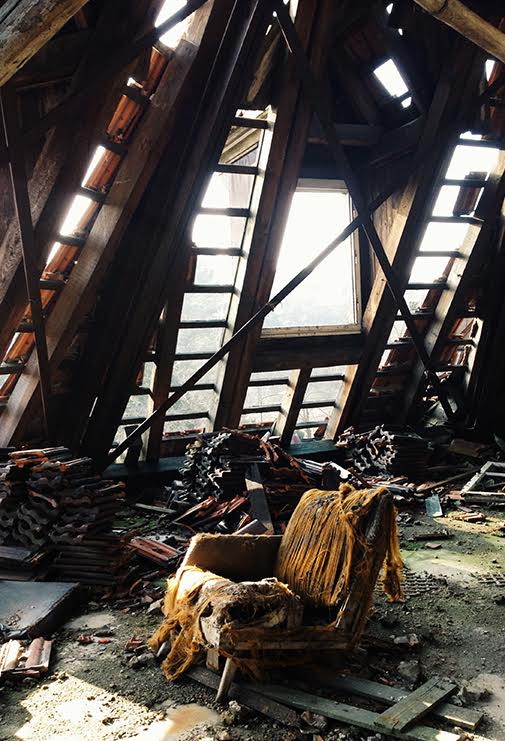- Vol. 02
- Chapter 12

The Chair
I shuffle into the abandoned building, to an upper room, half-drunk, but not from my homeless habit this time. My friend, John L, said to look after his place. I stare without a word (I always mumble words). Sunlight filters through the panes of glass cathedraling the walls and illumines the dust and mould that gossamer the attic air. Silvered fragments of cobwebs sift the sun and drape over the rust-orange sofa-chair in the middle of the room.
There’s something about that chair, the way it stands firm despite its spindly legs and tattered cushion… the weight it had endured. It appears strangely regal in the light.
On special occasions, and on bitter nights, John L would invite me and a couple others to share his place; he’d sit in that chair and tell us about the war. We all were there, too. Every time he’d get to the part about yanking his buddies out of a tank that took a mortar round, he’d stop and wipe his eyes. He couldn’t get them all out before it blew.
On the floor, a white paper bag lies crumpled. I recognize it from the last time I was here. John L would treat us to day-old bread that he got from the bakery a few blocks down the street. It wasn’t any of that soft tasteless store bread. It was good and crusty Moranto’s bread. (Though it might have been a little tough to jaw off a hunk with bad teeth.) He took care of us that way, and nobody in the neighborhood would dare steal his stuff.
An old A&P grocery cart with partly rusted rungs is still parked in the room’s corner. He’d tether that cart with a rope and pulley and haul it up a couple floors to this dilapidated joint. It baskets an old Army coat that the moths hadn’t completely eaten, and a few egg-sized rocks blackened from soot in a fire he’d use to heat them up in. He’d warm his socks, and ours, on those really cold nights. This is no mansion, but it was home.
The Chair
Even the rodents liked him. He’d call them each by name—there was no “dirty rat” here. Before the diabetes took him, he’d say that that we were his family. He loved us as much as his own daughter (who never visited even if she could). He wouldn’t cry much, except maybe for her, and his men he lost overseas. But one night, I saw him clutch something close to his chest and utter a few words—his eyes, still closed but aimed up, his neck craned, as if beyond the rafters. Later, he stashed it under the cushion and fell asleep. I never knew what it was.
I heard they’re going to demolition this place next week. I had to come, I promised. I edge towards the chair and slowly lift its cushion, as if it were sacred…the bold sunlight shimmers his bronze star.
